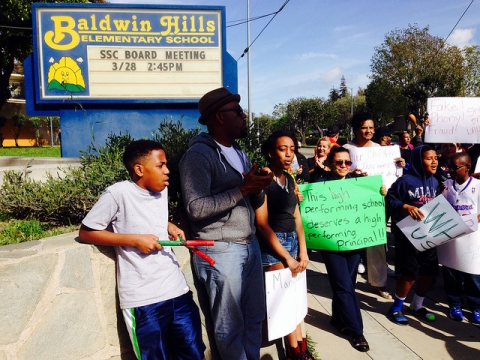
When Bud Fox tried to persuade Gordon Gekko regarding a business decision in the iconic movie Wall Street, Gekko responded, “Mixed feelings, Buddy,” saying it was like watching his nemesis, Sir Lawrence Wildman, driving off a cliff, but in Geckko’s “brand-new Maserati.”
That’s how conservatives should feel about the June 10 decision of Judge Rolf Treu of the Los Angeles County Superior Court in Vergara v. California, striking down four California statutes regarding teacher tenure. It will be a tremendous conservative victory for good education policy and fiscal policy if it survives on appeal. But the ruling might also be an example of judicial activism.
Treu noted several court cases, mostly from the California Supreme Court. They construe the California Constitution as guaranteeing a right to a quality education. Treu then found–correctly–that California’s statutes protect teachers’ jobs regardless of their job performance. California law instead requires schools to use a LIFO method for firing, meaning Last-In, First-Out. This forces administrators to retain ineffective teachers because of seniority, firing better teachers with fewer years’ experience.
The court noted the impact this has on the quality of education, and that the impact is disproportionately bad for minority students. So the Superior Court held that California’s laws failed “strict scrutiny,” a demanding standard for fundamental rights, where the government must prove that its law is narrowly tailored to achieve a truly compelling state interest. Treu held these statutes did not meet that high standard, and therefore violate the California Constitution.
These laws are wrongheaded; they’re bad public policy. They’re only on the books because of the power of the public teachers’ unions in California. This decision is a major setback for unions, if sustained on appeal. California’s children will benefit.
But those wrongheaded laws were nonetheless adopted by the California legislature, elected by the people of California. If this law is a bad law, then the voters can demand that their elected legislators change those laws. If the legislators refuse, then the voters can throw them out of office.
It’s not the role of judges to make such decisions. Perhaps Treu thought he was faithfully following California Supreme Court precedent. Perhaps he thinks those decisions were wrong, but that as a lower-court judge he is bound to follow them (which he certainly is). Or perhaps the California Constitution allows judges incredible leeway in interpreting the Golden State’s supreme law, empowering those judges to force the legislature to fund what the courts declare to be fundamental rights.
There is language in the California Constitution regarding education, which might provide Treu a basis for his decision. But generally speaking, whether it’s the Los Angeles County Superior Court or the California Supreme Court, courts should respect the fact that democracy includes the voters’ right to elect outrageously-bad politicians. People ultimately get the government they vote for.
It’s ironic that Treu cites as a leading case in his opinion the U.S. Supreme Court’s famous 1954 decision in Brown v. Board of Education, overruling the “separate but equal” doctrine from Plessy v. Ferguson that had been used to justify racially-segregated schools. The end result in Brown was 100 percent correct, but how the nation’s highest court got there is a different matter.
The U.S. Supreme Court should have held that the Equal Protection Clause of the Fourteenth Amendment was expressly enacted to abolish state laws and state actions that discriminate on the basis of race, and therefore that racial segregation in government schools is unconstitutional. Period. That’s what the rule of law looks like, subjecting government laws or actions to the plain meaning of the relevant provisions of the U.S. Constitution, which the American people adopted as the Supreme Law of the Land.
Instead, Chief Justice Earl Warren (ironically, also the former governor of California) said of the legal briefs and oral argument presented to the Court, “Although these sources cast some light, it is not enough to resolve the problem with which we are faced.”
To the contrary, the text and history of the Fourteenth Amendment were fully sufficient to rule the right way. But Warren instead waxed eloquent about psychology, social science, children’s behavior, and the importance and nature of public education. Then he cited these non-legal sources to justify his opinion, rather than base the Court’s decision purely on the U.S. Constitution.
In Brown, racially segregated schools certainly violated the U.S. Constitution. It will be interesting to see on appeal if California’s highest court agrees that California’s statutes truly violate the California Constitution, or instead if these judges have decided to play the role of legislators, without ever being elected to legislative office.
Ken Klukowski is senior legal analyst for Breitbart News. Follow him on Twitter @kenklukowski.

COMMENTS
Please let us know if you're having issues with commenting.